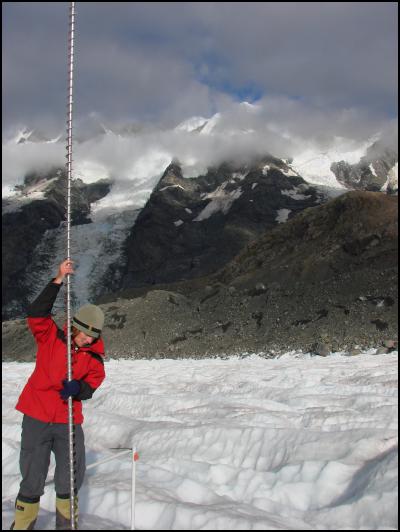Glacier tourism potentially under threat, researcher says
Glacier tourism potentially under threat, University
of Canterbury researcher says
May 9, 2014

Photo: Dr Heather
Purdie
Glacier tourism, a multimillion-dollar industry in New Zealand, is potentially under threat by ongoing glacial retreat, a University of Canterbury researcher says.
Geographer lecturer Dr Heather Purdie has been monitoring Fox Glacier since 2005 and during this time surveyed its latest advance that ended in 2008-09 and its current rapid retreat.
``I am increasingly interested in the impact that climate-driven glacier retreat will have on glacier tourism and the regions that are heavily reliant on glacier-related products.
``I am focusing on the physical changes at the glacier and how these impact on tourist access and safety. With our geography technicians Paul Bealing and Nicholas Key we recently surveyed freshly exposed slopes just above the glacier which are prone to rock fall using our new state of the art quadcopter.
``We took hundreds of photographs from the quadcopter so we can create a digital elevation model so myself and university geography colleague Dr Christopher Gomez can run experiments looking at how far rock falling from the slopes above the glacier, can potentially cascade out onto the glacier surface. This is important knowledge which will assist the local guiding company when planning safe routes for the guided walks.
``The current glacial retreat is making access increasingly difficult for guided walks at Fox and Franz Josef Glaciers, but simultaneously, an enlarging glacial lake at Tasman glacier is increasing tourism opportunities.
Steepening ice slopes, increased debris cover and an increase in rock fall hazard are just some of the challenges glacier tourism operators face at Fox and Franz Josef.
``The termini of the Fox and Franz Josef Glaciers are drawing increasingly close to their previous minimum which, coupled with thinning, indicates that retreat will continue for the near future.
``Adaptation to changes associated with retreat, like steepening ice slopes and increased rock fall, includes the increased use of helicopters to access flatter parts of the glacier, and shortening glacier length can be compensated by extending access tracks up valleys.
``But such solutions come at a cost, not only in monetary terms, but also in terms of increased environmental disturbance, and negotiation to establish acceptable degrees of adaptation will be ongoing.
``Despite dramatic changes in glacier length and thickness, glacier tourism has been maintained in New Zealand. The introduction of boat tours instead of walking tours on Tasman Glacier means that a century on, tourists can still visit the glacier.’’
Dr Purdie says access and viewing points will potentially become increasingly unsatisfactory as glaciers retreat into steeper, more inaccessible terrain.
Scientists, policy makers, and tour operators needed to work together, sharing knowledge, ideas and experience, to find a balance between utilisation, safety, and conservation, she says.
The Intergovernmental Panel on Climate Change noted that predicted glacier shrinkage and retreat would reduce visitor numbers in tourism-dependent towns like Fox Glacier and Franz Josef, but currently tourism on New Zealand glaciers is as busy as ever. Up to 400 tourists a day were guided to the glaciers last summer.
``Despite the challenges of maintaining glacier-related tourism as the glaciers retreat, the interest in glacier tourism is increasing. As a University of Canterbury researcher, I have a close working relationship with the guiding company (having previously worked as a glacier guide myself) and provide regular staff training and glacier updates,’’ Dr Purdie says.
ENDS


 Bill Bennett: Download Weekly - Starlink direct-to-mobile passes US regulatory hurdle
Bill Bennett: Download Weekly - Starlink direct-to-mobile passes US regulatory hurdle Plumbers Gasfitters and Drainlayers Board: Plumbers, Gasfitters And Drainlayers Board Drops ‘Journeyman’ And ‘Tradesman’ Names
Plumbers Gasfitters and Drainlayers Board: Plumbers, Gasfitters And Drainlayers Board Drops ‘Journeyman’ And ‘Tradesman’ Names ERANZ: Electricity Saving Coaching Service To Launch In Wairoa
ERANZ: Electricity Saving Coaching Service To Launch In Wairoa SolarZero Affected Staff: SolarZero Staff Are Demanding Answers After The Company Went Into Liquidation
SolarZero Affected Staff: SolarZero Staff Are Demanding Answers After The Company Went Into Liquidation Tātau Tātau O Te Wairoa: Guidance To Save Local Newspapers Amid NZME Closures
Tātau Tātau O Te Wairoa: Guidance To Save Local Newspapers Amid NZME Closures Commerce Commission: Systemic Breaches Of Consumer Law Lead To $1.5million Fine For Kiwibank
Commerce Commission: Systemic Breaches Of Consumer Law Lead To $1.5million Fine For Kiwibank



